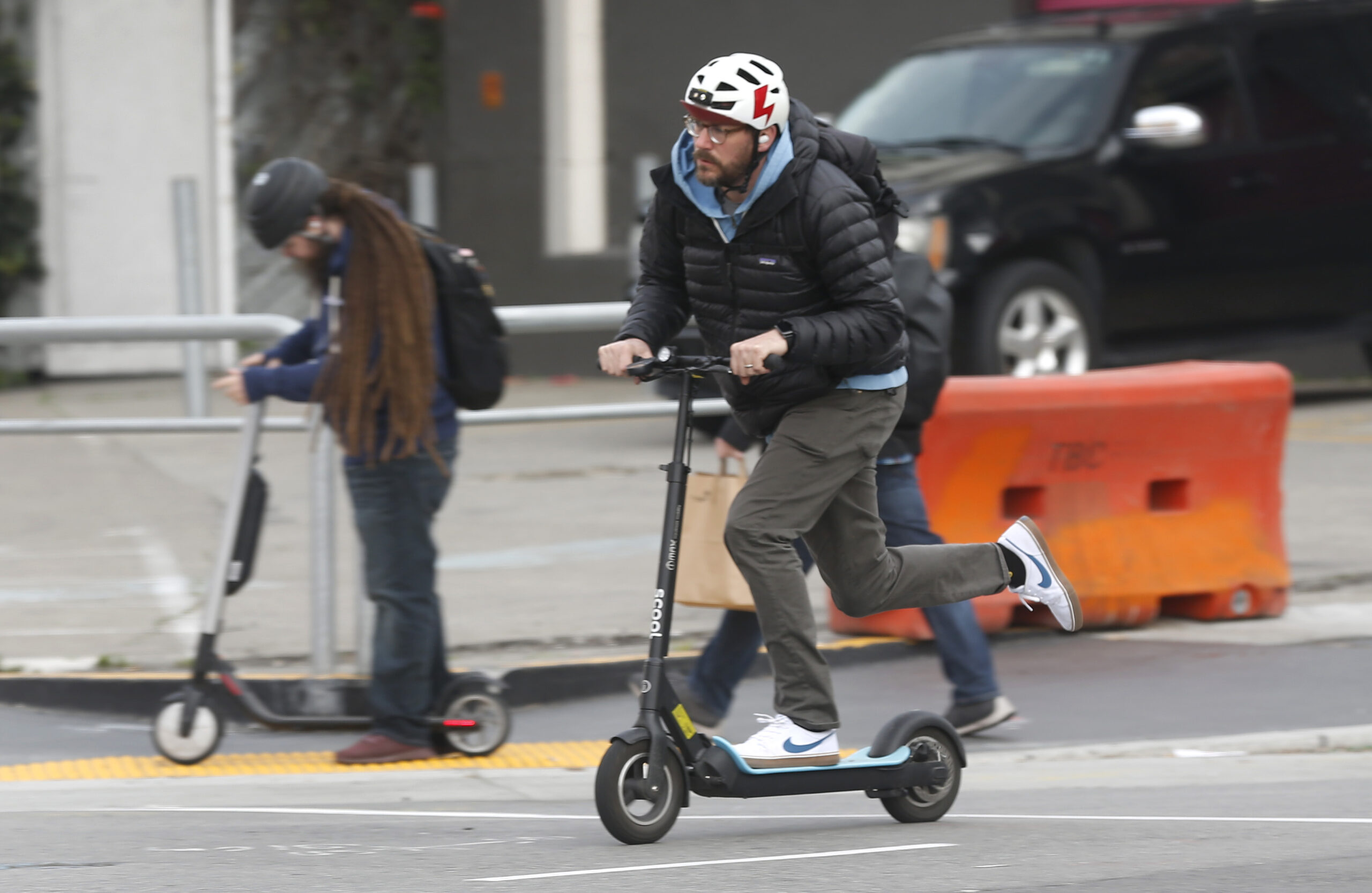Electric scooter companies that don’t deploy technology to keep the two-wheelers off sidewalks could lose their right to operate in San Francisco if a handful of supervisors have their way.
SF Supervisors Aaron Peskin, Shamann Walton and Connie Chan recently introduced a resolution urging the San Francisco Municipal Transportation Agency to immediately revoke permits for e-scooter firms that fail to install sidewalk deterrents on their vehicles. The proposal could be heard in committee as early as next week, when proponents hope to get input from SFMTA before moving onto the full Board of Supervisors for a final vote.
The resolution also urges the MTA to ramp up enforcement of scofflaw scooter users for double riding, wheeling along sidewalks and parking violations. To change consumer behavior, it also suggests that at least half of all fees from scooter citations be passed onto the user responsible for the ticketed offense.
And it points to San Diego as an example for how SF could respond. Earlier this summer, the SoCal city revoked permitting for scooter companies that failed to install geofencing, which de-activates the vehicles when they’re on sidewalks.
Bird—which along with Spin and Lime is one of the three major companies licensed to operate a combined 4,000 scooters in San Francisco—said it’s eager to work with the city on launching geofencing.
When San Diego banned e-scooters without the technology, Bird was the first company to get approval to operate again, a company spokesperson told The Standard in an email.
Phuong Bui, who leads government partnerships in Western states for Spin, said his company supports the intent of San Francisco’s resolution and has been working with MTA to implement geofencing while balancing “supply chain constraints, rising costs and significant thefts of our devices.”
Since March, Bui said, Spin has equipped hundreds of scooters with sidewalk detection sensors, and that its camera-and-AI technology has proved to accurately detect when the devices veer onto pedestrian walkways in real-time. The geofencing has been used not only on the Embarcadero, he said, but as far east as the Richmond and far south as Bayview.
But Spin isn’t totally on board with the resolution as written.
“Unfortunately, the incredibly high rates of theft and vandalism in San Francisco makes this new requirement financially unsustainable,” Bui explained. “We recommend the city therefore not immediately implement a 100% requirement for anti-sidewalk riding on all scooters until rampant theft and vandalism trends are meaningfully addressed.”
Lime did not immediately respond to requests for comment.
San Francisco’s three permitted scooter companies are already required by the MTA to develop, test and implement anti-sidewalk geofencing, but the resolution says the transit authority has rarely enforced the law and licensees have been “very slow” to roll out the technology.
As a result, only a small percentage of scooters are equipped with geofencing, according to the memo by Walton, Peskin and Chan. And if the city doesn’t act, they say more people could get hurt.
Motorized scooters can reach speeds of up to 15 mph, which the resolution says can seriously injure people. It cites Mayor’s Office of Disability Director Nicole Bohn as one such victim. Last year, she reported being hospitalized for months after a scooter rider illegally driving on a sidewalk struck her wheelchair.
Electric scooter crashes in San Francisco rose by 58% from 2020 to 2021, going from 97 to 153 last year, according to data collected through a city portal called TransBASE. Of the more than 150 crashes last year, 21 ended in severe injuries and one led to a death.
The scooters first wheeled into San Francisco in March 2018, when Bird and Lime introduced them with no rules or regulations to curb where to ride or park them.
Then the city started cracking down.
In April 2018, the City Attorney’s Office sent cease-and-desist orders to the trio of scooter companies because their devices had become a public nuisance, blocking walkways and endangering riders and pedestrians alike.
That same month, the Board of Supervisors created the city’s Powered Scooter Share Program, which gave the MTA and Department of Public Works enforcement authority over the nascent so-called micro-mobility fleets.
That April ordinance was followed a month later by the city’s launch of a permitting framework, which imposed fees and fines for companies and riders who flouted the rules about parking or blocking public rights-of-way.
But the city’s scooter troubles persisted.
Injuries mounted. People with disabilities reported the scooters as impediments when riders ditched the devices on sidewalks. Cyclists encountered similar problems in bike lanes.
Meanwhile, an untold number of scooters were thrown into the San Francisco Bay, according to Tuesday’s resolution, which described them as “causing significant environmental harm.” Fishing them out, it added, became “a significant financial cost” to taxpayers.
The MTA bills the scooters as a first-and-last-mile transportation solution, a way for people to easily go to and from public transit stops, the Peskin-Chan-Walton resolution states.
But the agency’s own data shows that Bird, Spin and Lime primarily deploy the devices in tourist hotspots such as the Embarcadero and Fisherman’s Wharf, where the memo says “users ride illegally on public sidewalks at great inconvenience and danger to pedestrians.”
Though the MTA has cracked down on the rentable e-scooters, the resolution’s backers say it hasn’t been nearly as strict as it should be.
From July 1 last year through Sept. 6 this past week, the MTA says it issued 12,078 citations for improperly parked e-scooters. Of those, 3,356 were issued to Bird, 5,261 to Lime and 3,461 to Spin. During that same timeframe, Bird paid $387,200 in fines, Lime paid $577,800 and Spin $390,850.
The transit authority tracks its micro-mobility fines on an online database, which shows that Lime has racked up the most penalties.
